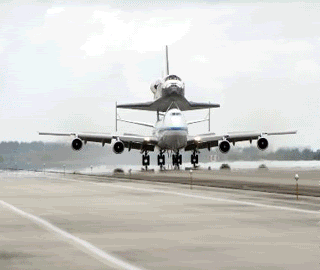 For every action there is an equal and opposite reaction: That law applies to rocket science, and apparently to an independent review panel's report on NASA's rocket options as well.
For every action there is an equal and opposite reaction: That law applies to rocket science, and apparently to an independent review panel's report on NASA's rocket options as well.The reactions to this week's full 155-page report on the future of NASA's human spaceflight were swift, and set forth opposite conclusions: On one hand, some members of Congress cast the report as an endorsement of NASA's current return-to-the-moon plan (running counter to the more widespread interpretation). Other members, meanwhile, blasted the report essentially because it wasn't an endorsement.
Although the focus of the report was to lay out the big picture for America's space effort, the political debate will more likely focus on one aspect of that picture: what to do about NASA's Ares I rocket. A prototype for that rocket is due for its first test launch on Tuesday, but the report is already sparking suggestions that the launch and any other work on the Ares I might be wasted effort.
Those are fighting words for the folks who have worked so hard over the past few years to get Ares this far - including the program's supporters in Congress. Between now and next February, the White House will have to decide whether to stay the course with Ares, potentially adding billions of dollars to the program's budget, or go another way.
The alternatives include adding enhancements to existing heavy-lift commercial launchers such as the Delta 4 and Atlas 5 (including sensors and an escape system for a spacecraft's crew), or relying on yet-to-be-tested launchers such as Space X's Falcon 9 and Orbital's Taurus 2, or going back to square one and redesigning a shuttle-derived launcher, or a combination of those options.
Stay the course, or change course? NBC News' Cape Canaveral correspondent, Jay Barbree, states the case for sticking with Ares. NBC News space analyst Jim Oberg, in contrast, likes the idea of low-cost commercial space taxis for trips to low Earth orbit.
Although the next move is up to the White House, it's clear that Congress intends to weigh in - and it would be a mistake not to take that into account. Alan Ladwig, NASA's deputy associate administrator for public liaison, recalls that a previous panel headed by aerospace executive Norman Augustine laid out a vision for NASA exploration back in 1990 - but that the vision went nowhere because Congress wasn't on board.
"I think if they do that again, it's dead on arrival," Ladwig said this week at the International Symposium for Personal and Commercial Spaceflight.








No comments:
Post a Comment